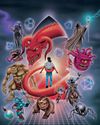
WHAT IF STEPHEN Sondheim had never written a word, or a note of music, after his 30th birthday? What if, grief-stricken at the death of his mentor, Oscar Hammerstein II, in 1960, the young composer had simply decided that he had done his part for musical theater and was ready to try something new? Had that happened, we would still, today, more than six decades later, be memorializing a man who, via his lyrics for Gypsy and West Side Story, made an indelible contribution to the history of American musical theater—specifically, to modernizing it, to darkening it, to helping it burst what were then thought to be the boundaries of its form.
Sondheim did not stop, of course. His writing for those two seminal shows was, in the context of his full body of work, a warm-up—a quick set of stretches before a career that would define and redefine an entire popular art. If it is true that, as Jack Nicholson remarked when Marlon Brando died, every other living actor just moved up one place, the image seems inadequate to mark Sondheim’s passing, at 91, after a long and astonishingly productive life. If anything, it means that the question of who America’s greatest living musical-theater artist is can finally lead to an interesting discussion, because for the first time in decades, the answer isn’t obvious. With Sondheim, there was no list of people waiting to move up one. He was his own list—and his measureless influence lives in the work of just about everyone who survives him.
Diese Geschichte stammt aus der December 6-19, 2021-Ausgabe von New York magazine.
Starten Sie Ihre 7-tägige kostenlose Testversion von Magzter GOLD, um auf Tausende kuratierte Premium-Storys sowie über 8.000 Zeitschriften und Zeitungen zuzugreifen.
Bereits Abonnent ? Anmelden
Diese Geschichte stammt aus der December 6-19, 2021-Ausgabe von New York magazine.
Starten Sie Ihre 7-tägige kostenlose Testversion von Magzter GOLD, um auf Tausende kuratierte Premium-Storys sowie über 8.000 Zeitschriften und Zeitungen zuzugreifen.
Bereits Abonnent? Anmelden

LIFE AS A MILLENNIAL STAGE MOM
A journey into the CUTTHROAT and ADORABLE world of professional CHILD ACTORS.

THE NEXT DRUG EPIDEMIC IS BLUE RASPBERRY FLAVORED
When the Amor brothers started selling tanks of flavored nitrous oxide at their chain of head shops, they didn't realize their brand would become synonymous with the country's burgeoning addiction to gas.

Two Texans in Williamsburg
David Nuss and Sarah Martin-Nuss tried to decorate their house on their own— until they realized they needed help: Like, how do we not just go to Pottery Barn?”

ADRIEN BRODY FOUND THE PART
The Brutalist is the best, most personal work he's done since The Pianist.

Art, Basil
Manuela is a farm-to-table gallery for hungry collectors.

'Sometimes a Single Word Is Enough to Open a Door'
How George C. Wolfein collaboration with Audra McDonald-subtly, indelibly reimagined musical theater's most domineering stage mother.

Rolling the Dice on Bird Flu
Denial, resilience, déjà vu.

The Most Dangerous Game
Fifty years on, Dungeons & Dragons has only grown more popular. But it continues to be misunderstood.

88 MINUTES WITH...Andy Kim
The new senator from New Jersey has vowed to shake up the political Establishment, a difficult task in Trump's Washington.

Apex Stomps In
The $44.6 million mega-Stegosaurus goes on view (for a while) at the American Museum of Natural History.